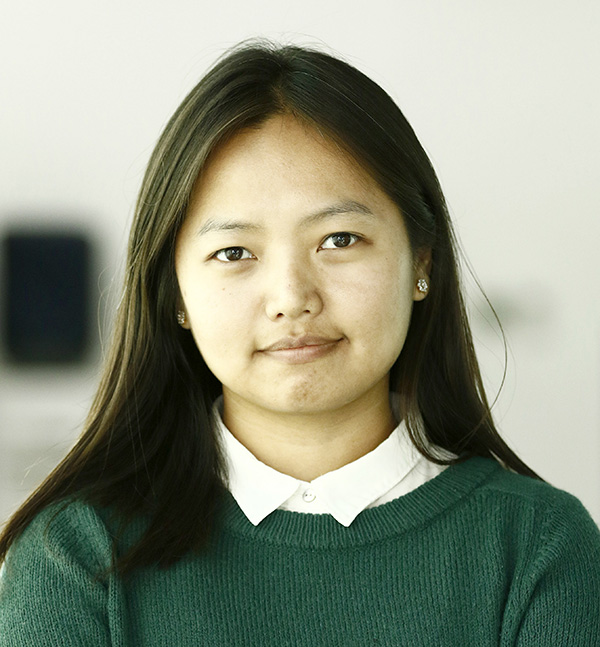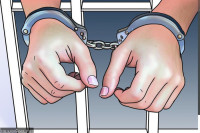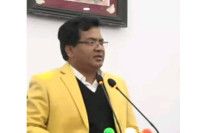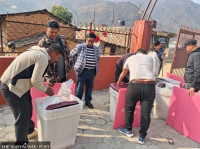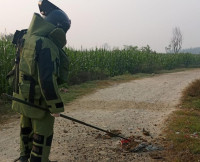National
Delay in decision over citizenship through mothers leaves young people waiting—and without much hope
Nepal is one of 27 countries in the world with unequal citizenship laws, limiting women’s rights to pass on citizenship to a child or a non-citizen spouse.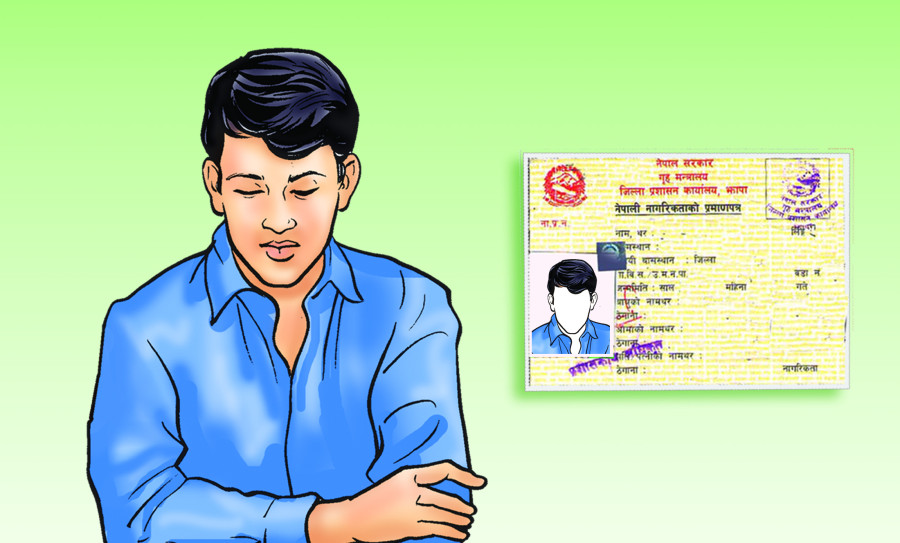
Tsering D Gurung
The first time Anil Tamrakar visited the District Administration’s Office in Kathmandu to apply for citizenship, he was told the law didn’t recognise him as a citizen.
But there was hope. A new constitution was being written and Tamrakar, a child of a Nepali mother and a foreign father, was assured that after the constitution’s promulgation, he would get citizenship through his mother. So he waited patiently.
A year passed, then two, and then three. Then the news broke that the Constituent Assembly, the body tasked with writing the new constitution, had been dissolved and the dates for a new election kept getting pushed back.
Tamrakar, who spoke to the Post on condition that he only be identified by a pseudonym because his friends don’t know about his status, said he was devastated. Like many of his classmates in high school, he had been planning to go to Australia for college. And now he couldn’t.
By the time the new Constituent Assembly elections finally took place in November 2013, Tamrakar had bid farewell to six of his closest friends. With each friend’s departure for colleges abroad, he felt more and more dejected.
Tamrakar, now 26, said he even had suicidal thoughts at one point.
“It was just so frustrating,” said Tamrakar. “I studied hard, got good grades, did everything I was supposed to fulfil my wish of getting foreign education. All that amounted to nothing because my government doesn’t think I am an eligible citizen just because I don’t have a Nepali father.”
Technically, Tamrakar was already eligible for naturalised citizenship when he visited the district office for the first time in 2010.
Even though the new constitution hadn’t been promulgated then, the interim constitution had a provision for children born to Nepali mothers and foreign fathers to receive naturalised citizenship—the same provision that is in the current constitution.
Also as per Article 5.2 of the Citizenship Act-2006, “a child born to a Nepali female citizen from marriage with a foreign citizen in Nepal and having permanent domicile in Nepal, may be granted naturalised citizenship, provided the child has not acquired the citizenship of the foreign country on the basis of the citizenship of his/her father.”
Despite this, officials at the Kathmandu District Administration Office have repeatedly refused to accept Tamrakar’s citizenship application.
“Before the constitution was promulgated, they’d say, ‘didn’t we tell you to come back only after the constitution is promulgated,’” Tamrakar said, recalling his conversation with the officials. “And after the Constitution was promulgated, they’d say ‘wait for a few more months for the law to come into effect’.”
In an interview with the Post, Kathmandu Chief District Officer Ram Prasad Acharya admitted his office was not accepting citizenship applications of those with foreign fathers and individuals whose father’s identity is unknown.
“We have no issue providing citizenship in the mother’s name to those individuals who can bring proof of their father’s identity or their grand father’s,” said Acharya. “But until the new bill is passed, we can’t process applications of those who have foreign father or whose father’s identity is unknown.”
When asked why that was the case since the current laws already have provisions for providing citizenship to individuals under those circumstances, Acharya said his office had to be cautious as citizenship is a sensitive issue.
“Who is going to be liable when these applicants turn out to be non-Nepalis?” he said.
Nepal is one of 27 countries in the world with unequal citizenship laws, limiting women’s rights to pass on citizenship to a child or a non-citizen spouse. While a Nepali citizen mother married to a foreign national can only pass on naturalised citizenship to her children, there exists no such condition for children born to a Nepali citizen father and a non-Nepali mother. Likewise, a single mother can pass on citizenship by descent to her child, provided the father’s identity is unknown.
By attaching conditions to how women can pass on citizenship, the state, according to some activists, has essentially rendered women as second-class citizens.

Women activists take out a rally against discriminatory provisions of citizenship law in Kathmandu in this 2018 file photo.
“By focusing only on the father’s identity, the state is saying that a mother’s identity doesn’t matter at all,” said Deepti Gurung, who started the Citizenship Affected People’s Network, an informal group of people who have been unable to obtain citizenship. “We have to ask the state whether it considers its female citizens to be whole citizens or not.”
Even though individuals such as Tamrakar can obtain Nepali citizenship through naturalisation—on the paper—through their mother, in reality, it is nearly impossible to receive one, according to advocates for equality in citizenship.
“Because naturalisation is not a fundamental right guaranteed under the constitution, it is at the state’s discretion to either accept or reject such applications,” said Subin Mulmi of the non-profit Forum for Women, Law and Development in an earlier interview. “And this has led to authorities wilfully disregarding such applications without any valid explanation.”
According to Mulmi, the process of obtaining naturalised citizenship through a mother is extremely lengthy and one that’s riddled with complications.
First, an applicant needs to receive a recommendation from the Ward Office, then he/she needs to present proof of not obtaining citizenship of their father’s country, and then the application is to be reviewed by the chief district officer who decides whether to forward it to the Home Ministry or reject it.
“Very few applications make it to the Home Ministry and of those, only a minuscule number gets approved,” said Mulmi.
Between 2009 and 2017, only 13 such naturalised citizenship certificates had been issued by the Ministry of Home Affairs, less than two per year. An estimated 5.4 million individuals, nearly a quarter of the population aged 16 and over, do not have citizenship documentation in the country, according to the 2018 US State Department’s annual report on human rights in Nepal.
“Constitutional provisions, laws, and regulations governing citizenship discriminated by the gender of the registering parents, which contributed to statelessness,” the report noted. “The legal and practical restrictions on transferring citizenship imposed particular hardships on children whose fathers were deceased, had abandoned the family, or (as was increasingly common) departed the country to work abroad.”
Without citizenship documents, these individuals are not able to register to vote, open bank accounts, apply for a driving licence, buy or sell land, appear for professional exams, register marriages or births, and receive state social benefits.
Tamrakar, who has been helping a friend run a restaurant in the Valley, says he has to depend on friends for every little thing: whether it is opening a bank account or driving him around.
“I have to use my friends’ bank accounts to receive my salary, I have to ask them to drive me home when I am working late, I can’t open a business under my own name,” he said.
In 2011, the Supreme Court decided on a landmark case of Sabina Damai v the Government of Nepal, Office of the Prime Minister and Cabinet of Ministers, etc.
Damai, a resident of Dolakha, had been trying to get citizenship through her mother, but her application had been repeatedly rejected by the District Administration Office.
The court ruled in Damai’s favor, stating citizenship certificates should be provided through mother in cases where the child is born in Nepal to a Nepali mother and the father is not traced, and said the law had not been implemented correctly.
In 2015, Gurung, the activist who quit her job to devote her time fully to advocating for equal citizenship rights for women, went to court after the Kathmandu District Administration Office refused to accept her daughter’s applications for citizenship in her name. Two years later, the court ruled in her favour.
Despite multiple court precedents, like Gurung’s, the district administration offices across the country have repeatedly refused to accept applications for citizenship through mothers.
“I don’t understand why they are so hesitant to give a citizenship to me when they have no hesitation doling out citizenship certificate to a foreigner who has only been in the country for a month,” said Yabesh Adhikari, 19, referring to the recent news about a Pakistani woman who received Nepali citizenship within a month of her marriage to a Nepali man.
Adhikari, who has been trying for the past year to receive his citizenship through his mother, said that local officials told him he would have to wait until the passage of the Citizenship Amendment Bill, currently being discussed at the State Affairs and Good Governance Committee.
Tamrakar, Adhikari and Gurung say they believe the situation of stateless people is worse than refugees. “At least refugees are given status and documentation that allows them to travel and study,” said Gurung. “But stateless people exist as invisible ghosts.”
In recent weeks, the State Affairs and Good Governance committee which has been deliberating over the Citizenship Amendment Bill, has drawn flak for sexist comments made by male lawmakers during its meetings.
When discussing the provision for women to pass on citizenship by descent to her children in cases of the father’s identity is unknown, one lawmaker commented: “What will happen when women bring foreign children into the country and these children will be granted citizenship by descent without having to identify their father,” he asked.
Gurung says women need to be wary about the discussions surrounding the Citizenship Amendment Bill. “Our fate is being written in that room,” said Gurung, referring to the parliamentary committee. “We must pay attention to what’s being said and decided in that room. This is not an issue for just a few of us, this should concern all of us.”
Last week, the committee announced it had formed a sub-committee to finalise the process for citizenship by naturalisation after multiple meetings failed to reach a consensus. The nine-member subcommittee has been given two weeks time to resolve the debate over contentious provisions and submit a final report.
“I have spent nearly ten years of my life just waiting, naively believing that one day I will get my citizenship,” said Tamrakar. “I just don’t know how much longer I can wait.”




 10.97°C Kathmandu
10.97°C Kathmandu